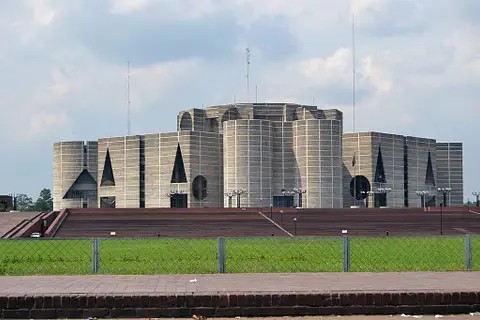Human history is littered with the mass rape of women, which has time and again become even more pervasive during wartime. During the Bangladesh Liberation War of 1971, which led to the independence of Bangladesh on December 16, the Pakistani army did not stay behind. It systematically weaponized rape as an instrument of war against Bengalis. The aim was simple: to dilute a people’s racial identity, to destroy their nationalism, and to dishonor the enemy by invading the sanctity of their women. A fatwa, a formal religious opinion or decree, was issued declaring Bengali and Hindu women as the war booty, ganimah (an Islamic term historically used to refer to spoils of war, including captives).
Aggressive military policies, religious justification, and other wartime motives such as psychological warfare, strategic humiliation, and revenge were present during the wartime atrocities. The central government of then West Pakistan, in its unquestionable subservience to the so-called religious decree, descended into one of the worst lapses into barbarism in South Asian history. From late March to mid-December 1971, what followed was not merely an inevitable by-product of war but a systematic campaign of mass rape and ethnic cleansing.
Between 200,000 and 400,000 women were raped during those nine months of the war, according to international estimates. But the Bangladeshi government has long maintained that this was only 10 percent of the actual figures. The victims were brutalized indiscriminately, from age seven to seventy; no one was left spared. Soldiers raided universities, homes, and entire villages, dragging women away as captives and confining them to military cantonments, where they were passed around and raped in turns. They were kept as sex slaves for the duration of the war, often tied to trees or poles and repeatedly assaulted. Many succumbed to the repeated sexual assaults and gang rapes.
The violence was not isolated; it spread like an epidemic. The terror disseminated across East Pakistan like wildfire. Both the Bengali and Hindu women were targeted. Families desperately hid their daughters wherever they could, inside rice bins, beneath ponds. But to their dismay, most of the time, they were still found by the soldiers. Muslim women were forcibly impregnated by the soldiers, who often released them only once they were visibly pregnant, while Hindu women were mostly executed after being raped. Many survivors later recalled the words their assailants spat at them: “We are leaving, but our blood will stay inside your womb.”
In the months that followed, the aftermath was just as haunting as the war itself because of social and other reasons. It is estimated that between 25,000 and 70,000 pregnancies occurred as a result of the rapes— though the actual numbers are believed to be far higher — during the war. Hundreds of thousands of war babies were born, many delivered inside the very cantonments where their mothers had been captive. There was no psychological or medical aid available to them, and many died at the hands of unskilled midwives. Those who survived often abandoned the children they never chose to bear. One survivor recalled: “I left my baby by the river. I couldn’t look at him; he reminded me of everything I wanted to forget.”

Dhaka Opinion Magazine is a global/international opinion magazine. It publishes for you all. The magazine publishes with the aim to help address concerns, improve conditions, solve problems and mitigate conflicts all over the world. Your support is important for the esteemed magazine. You can sponsor the magazine and/or donate to it…
The human mind can only bear so much. For many, death was the only escape. Not only did infanticide become pervasive, but so did the suicide rate. First-hand witness accounts reveal how women hung themselves with their own hair to escape the humiliation and ostracism of society. In Bengali culture, hair was associated with femininity and dignity; women usually had very long and thick hair. The soldiers responded to the mass suicides by chopping their hair off.
On 22nd December 1971, six days after Bangladesh was created, Sheikh Mujibur Rahman, the independence leader of the nation, honored these women with the title “Birangona,” a Bengali term coined to recognize the women who were raped during the war, in recognition of their suffering. Bangladesh later enacted the Bangladesh Abandoned Children (Special Provisions) Order 1972 and took several measures. Following the war, abortion camps were set up to terminate unwanted pregnancies. Adoption drives soon followed, and many of the war babies were sent abroad, mostly to Canada and the Netherlands, often without the consent of their mothers. In an attempt to rebuild their lives, the state introduced programs of rehabilitation and training.
The Birangona were enrolled into rehabilitation centers, taught vocational skills, and in some cases sent abroad as domestic workers. Yet how tragic it is that these measures came only as compensation for their unimaginable suffering. And yet, many stayed behind, rejected by their families, ostracized by society, and labeled in society as impure for life. Although a “marry-off” campaign had been made by the state, encouraging men to step forward and embrace these war heroines, nothing could ever compensate for the trauma and grief these women carried within them.
But no policy, no measure could undo what had been done to the Bengali women. History may call them heroines, but it was silence, not honor, that followed them home. No way they can be compensated. While the government of Pakistan needs to reckon with the atrocities committed during the liberation war, the government of Bangladesh needs to give a proper welcome to those who come back to Bangladesh in search of their roots.
DISCLAIMER: The views expressed are those of the authors and do not necessarily reflect the official policy or position of the Magazine and its editorial team. Views published are the sole responsibility of the author(s).

